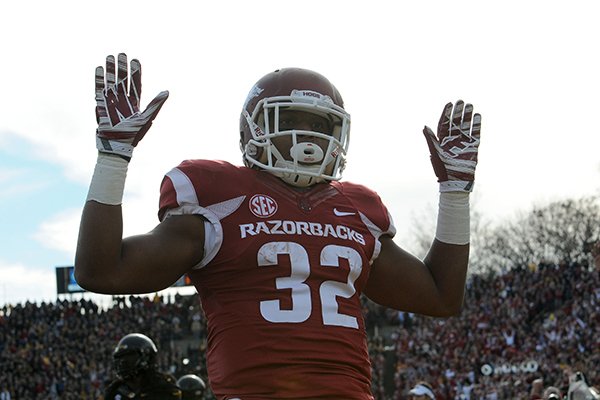FAYETTEVILLE -- Five St. Louis Rams players received immediate national attention Sunday when they orchestrated a "Hands Up, Don't Shoot," pose during pregame introductions before beating Oakland 52-0 at the Edward Jones Dome.
Rams tight end Jared Cook said he and his teammates wanted to show solidarity with protesters who have been using the gesture since a grand jury's announcement last week that former Ferguson (Mo.) police officer Darren Wilson, who is white, will not be indicted in the fatal shooting of unarmed black teenager Michael Brown on Aug. 9.
But two days before the Rams demonstrated on the field of their downtown St. Louis domed stadium, Arkansas junior tailback Jonathan Williams made a similar gesture, about 120 miles to the west.
Williams appeared to strike the "Hands Up, Don't Shoot," pose in the end zone after scoring a touchdown on a 23-yard pass play from Brandon Allen during the first quarter of Friday's Arkansas-Missouri game at Faurot Field in Columbia, Mo.
But Williams' gesture went mostly unnoticed.
It wasn't mentioned by the CBS broadcast crew, and it wasn't evident to reporters sitting in the press box high above the field, but Douglas Arnst from The Washington Times newspaper took notice and made reference to it Friday in a blog post, and word gradually began spreading through social media during the weekend.
A close-proximity photograph, taken by the Arkansas Democrat-Gazette, shows Williams, palms facing forward with elbows raised, making what appears to be the "Hands Up, Don't Shoot" gesture rather than signaling that he scored a touchdown.
The Democrat-Gazette requested comment from Arkansas Athletic Director Jeff Long and Coach Bret Bielema regarding Williams' gesture, but Long and Bielema had not been reached at press time Monday night.
A request to interview Williams to ask what he meant by the gesture was not fulfilled.
Williams, a junior from Allen, Texas, has 188 carries for 1,085 yards and 11 touchdowns this season and 11 receptions for 65 yards and 2 touchdowns.
Williams hasn't posted a comment on his Twitter account, but he has drawn a lot of responses.
After Williams posted "Thank the lord for another day" Sunday, a follower replied, "as long as you don't attack a cop, you will get to see another one."
Williams then replied, "and why would I do that."
The St. Louis police officer's association issued a letter Sunday night condemning the Rams' demonstration as "tasteless, offensive and inflammatory," and asked the Rams and NFL to discipline the players and issue a public apology.
The NFL declined to do so.
"We respect and understand the concerns of all individuals who have expressed views on this tragic situation," NFL spokesman Brian McCarthy said in a statement to USA Today.
Some on social media thanked Williams for his gesture. Others have criticized it for being inappropriate and divisive.
The Rams and Williams aren't the first athletes to use a sports events as a platform to make political statements.
The Associated Press compiled a list of some of the most famous protests:
• Tommie Smith and John Carlos: The most iconic moment of them all. American sprinters Smith and Carlos took to the medal stand at the Mexico City Olympics in 1968 and raised their gloved fists -- the Black Power salute. It was a time of enormous racial tension in the United States, and the gesture was front-page news in hundreds of newspapers. The athletes were booed out of the stadium and expelled from the Olympics.
• Obama Salute: Broncos receiver Brandon Marshall started to pull a black-and-white glove out of his shirt, designed to honor Barack Obama shortly after he was elected President in 2008. But a teammate stopped him, fearing he might draw a penalty.
• LeBron, Heat and hoodies: LeBron James and Dwyane Wade got the Heat to pose for a team picture with all the players wearing hoodies, the same thing Trayvon Martin was wearing when he was shot to death in 2012.
Along with Cook and Bailey, other Rams gesturing during introductions were Tavon Austin, Kenny Britt and Chris Givens.
"I don't want the people in the community to feel like we turned a blind eye to it," Britt said of the Ferguson situation. "What would I like to see happen? Change in America."
The Associated Press and USA Today contributed information this story
Sports on 12/02/2014
St. Louis police group criticizes Rams players
28209715

